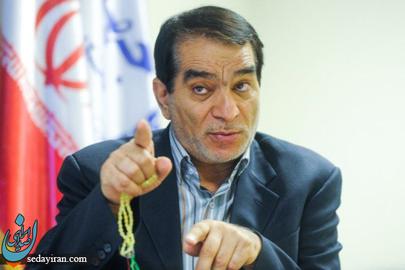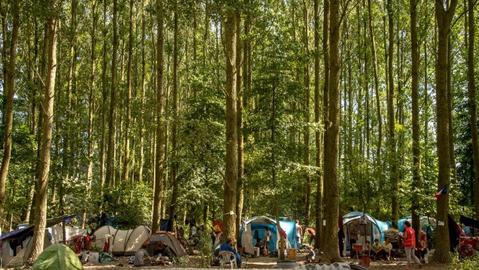A conservative politician with a reputation for using political connections to build his personal wealth has faced new accusations of corruption, having been the subject of similar allegations in the past.
Speaking at a meeting on June 17 to discuss the protection of public properties, Reza Rahmani, the prosecutor for Lahijan in the northern province of Gilan, said Mohsen Kouhkan, a conservative principlist member of parliament from Lenjan in Isfahan Province, had burnt tea farms to build lucrative property illegally [Persian link]. “The people’s representative from a certain province burns the American flag in the parliament and then comes to the north to build villas by burning tea plantations,” he said without naming Kouhkan directly. “In my view, he is no different from the Americans.”
A day later Kouhkan filed a legal complaint against Rahmani [Persian link] for defamation and libel in connection for his comments about the tea farms and burning the American flag. However, he did not directly mention the prosecutor’s accusations about him illegally building villas.
Following the clash, people posted photographs on social media of a villa that allegedly belonged to Kouhkan, leading to the re-emergence of other stories about the politician’s previous corrupt business deals.
Kouhkan was a member of the Chamber of Commerce for many years, and very active in various businesses. He was also an officer for the Kosar Housing Cooperative, which belonged to members of the parliament and its employees. Some years earlier, Akbar Alami, a former member of the parliament and a lawyer who represented plaintiffs in a case against the cooperative, had accused Kouhkan and other officers of corruption [Persian link]. Alami accused Kouhkan, along with Iraj Nadimi and Taher Agha-Barzegar, of registering a deed to a nine-story, 17,700-square-meter property with 360 units in their own names. Although the property belonged to a partnership group of 358 people, Alami said Kouhkan and the others refused to turn over the deed to the rightful owners.
Kouhkan and a number of other members of the cooperative’s board of directors were also accused, among other things, of “selling tens of co-op apartments belonging to hundreds of shareholders in one project” and creating “counterfeit documents” [Persian link]. According to Alami, Kouhkan and his accomplices took over the ownership of more than 23 apartments and then registered them in the names of members of their families and relatives.
In 2012, in connection with the same case, it was reported that Kouhkan and Iraj Nadimi, a member of parliament from Lahijan, were among Bank Melli’s biggest individual debtors [Persian link]. Kouhkan and Nadimi allegedly owed the bank 9 billion tomans (US$7.4 million at the 2012 exchange rate). The two men, however, claimed that they had taken out the loan on behalf of the housing cooperative. Mohsen Kouhkan even claimed that the loan had benefited the bank as well because he said the length of time it would take for the repayment would mean the bank would receive more money due to its 18 percent interest rate.
Links to the Judiciary
After Kouhkan filed his complaint against Reza Rahmani, the website Saham News revealed that his brother Amir Kouhkan was the former examining magistrate at Branch 703 of Narmak Judicial Complex in Tehran. Other news websites reported that Kouhkan had also benefited from land grabs in Isfahan through his connections with the judiciary.
In 2012, Mohsen Kouhkan ran in the elections for the 9th Iranian parliament but, despite the fact he was on the governing body of the outgoing parliament, he was disqualified as a candidate, reportedly because of his corrupt dealings.
Eventually, however, the Guardian Council confirmed his candidacy.
Kouhkan represents the city of Lanjan in the province of Isfahan. Like many Islamic Republic officials, he started his career with the Islamic Republican Party and the Revolutionary Guards.
During the times Kouhkan was not serving in the parliament, he was a member of the Chamber of Commerce in various capacities, including as its deputy executive director. While in parliament, he sat on a number of committees dealing with industry and the economy, which provided him with a good opportunity to further his business interests.
In politics, he initially had a close relationship with moderate principlist Mohammad-Reza Bahonar but in the current 10th parliament, he moved further to the right and is no longer considered to be a supporter of Ali Larijani, speaker of the parliament.
In May 2018, after President Donald Trump took the United States out of the nuclear agreement with Iran, Mohsen Kouhkan burned an American flag and a copy of the agreement inside parliament’s chamber. His action was roundly criticized by the outspoken MP Ali Motahari and a number of other members of the parliament. Another MP, Alireza Rahimi, tweeted his opposition to the move, stating: “Islamic culture, as well as [being based on] rationality and political logic, rejects acts such as setting fire to the flag of other nations.” And moderate MP Fatemeh Saeedi tweeted that setting fire to another country’s flag would not secure Iran’s national interests. “Flags are symbols of nations and it is our responsibility to respect other nations,” she wrote.
In his defense, Kouhkan said that it was an individual initiative and that he made the decision without coordinating with anyone else. “We should have shown our revolutionary anger to 40 years of US enmity against Iran,” he wrote, further stating: "I set fire to the US flag because I was not able to find a photo of Trump."
Several of Iran's parliamentarians have come under scrutiny for corruption on a regular basis, including Alaeddin Boroujerdi, Arsalan Fathipour and Mohammad Shahi-Arablou.
But for the moment, Mohsen Kouhkan has survived the persistent accusations of corruption. The new case accusing him of burning tea farms to build villas marks a new chapter in an ongoing string of corruption scandals. It remains to be seen whether he will emerge unscathed, but given his talent for evading reprisals, it seems unlikely that he will endure any serious damage to his wealth or his political career.
How the Corruption Mafia Took $30 Billion out of Iran in One Year, May 28, 2019
Petrochemical Corruption Scandal Grips the Nation, March 11, 2019
Corruption in Iran and the Fishermen Who Lose Out, March 4, 2019
Iran’s Medicine Shortage: More About Corruption and Mismanagement Than Sanctions, September 7, 2018
Corruption is Here — Get Used to It, July 26, 2018
Is Iran Becoming More Corrupt?, March 12, 2018
Currency Plummets as Corruption and Incompetence Continues, April 18, 2018
Iran’s Latest Corruption Scandal: Who’s to Blame?, October 25, 2016
Journalist Arrested After Reporting on Corruption, September 19, 2016
Iran Blocks News Sites Following Corruption Reports, September 5, 2016
What the People Say: Banks are the Most Corrupt Institutions in Iran, January 28, 2016
visit the accountability section
In this section of Iran Wire, you can contact the officials and launch your campaign for various problems

























comments